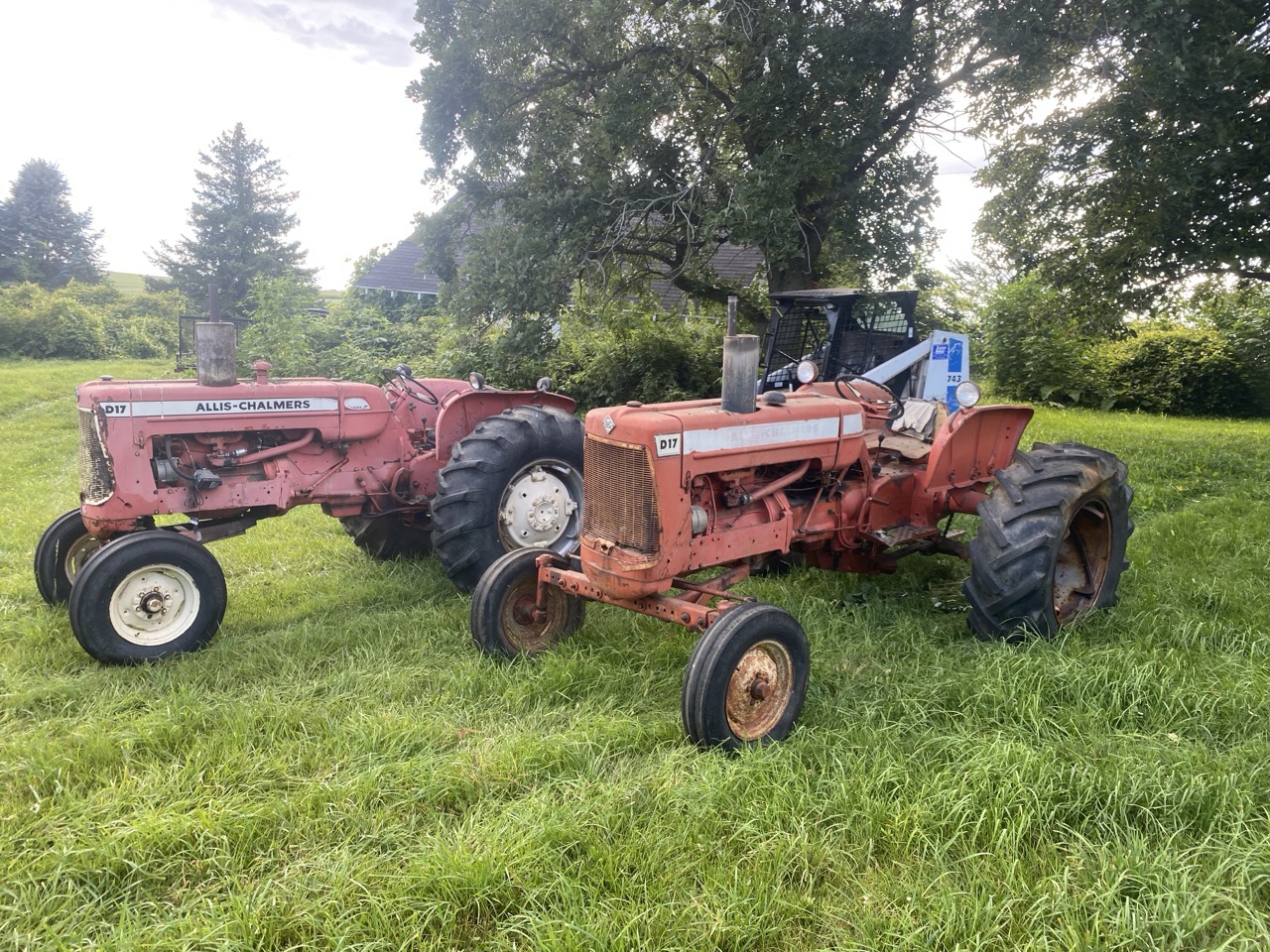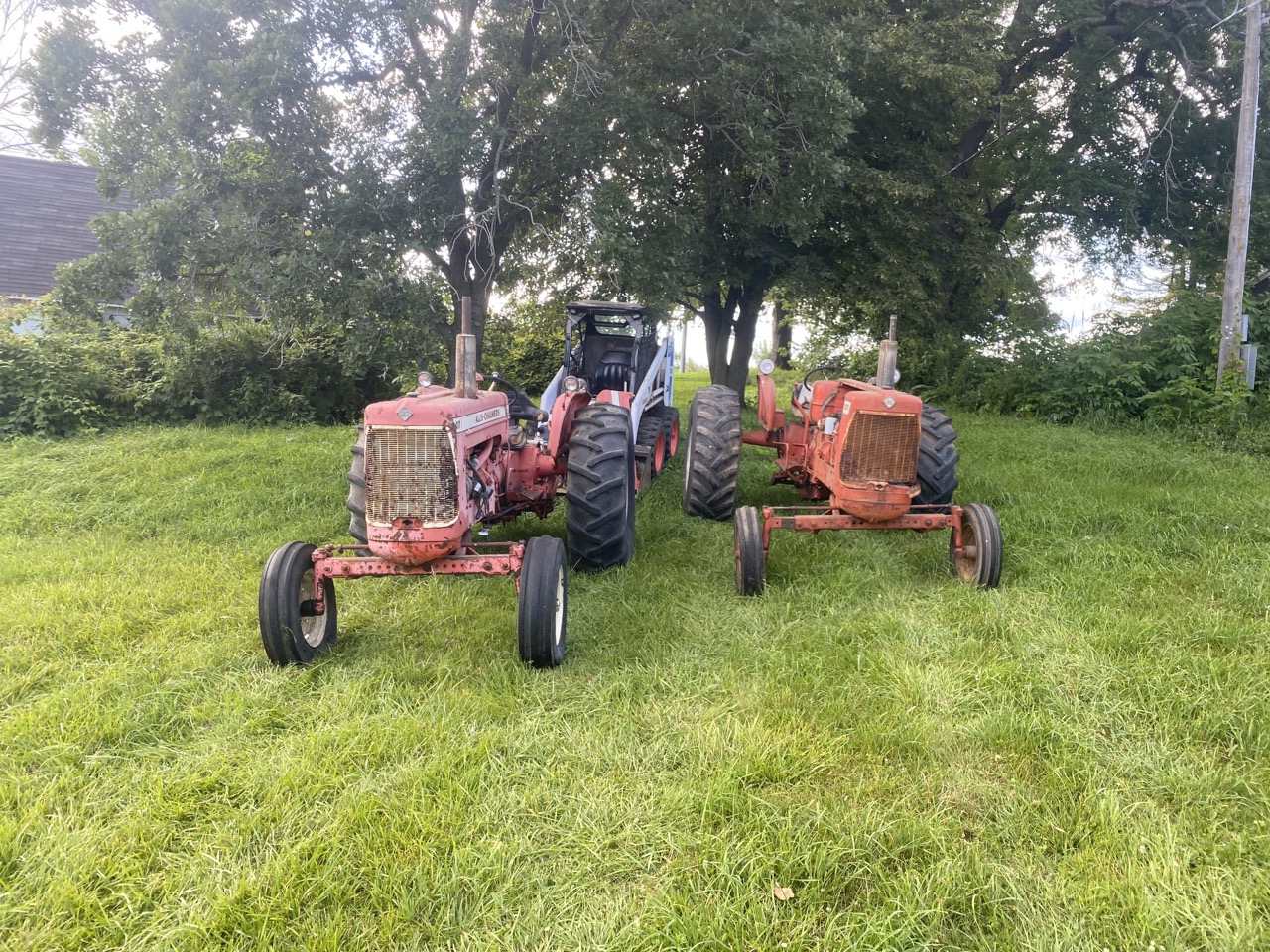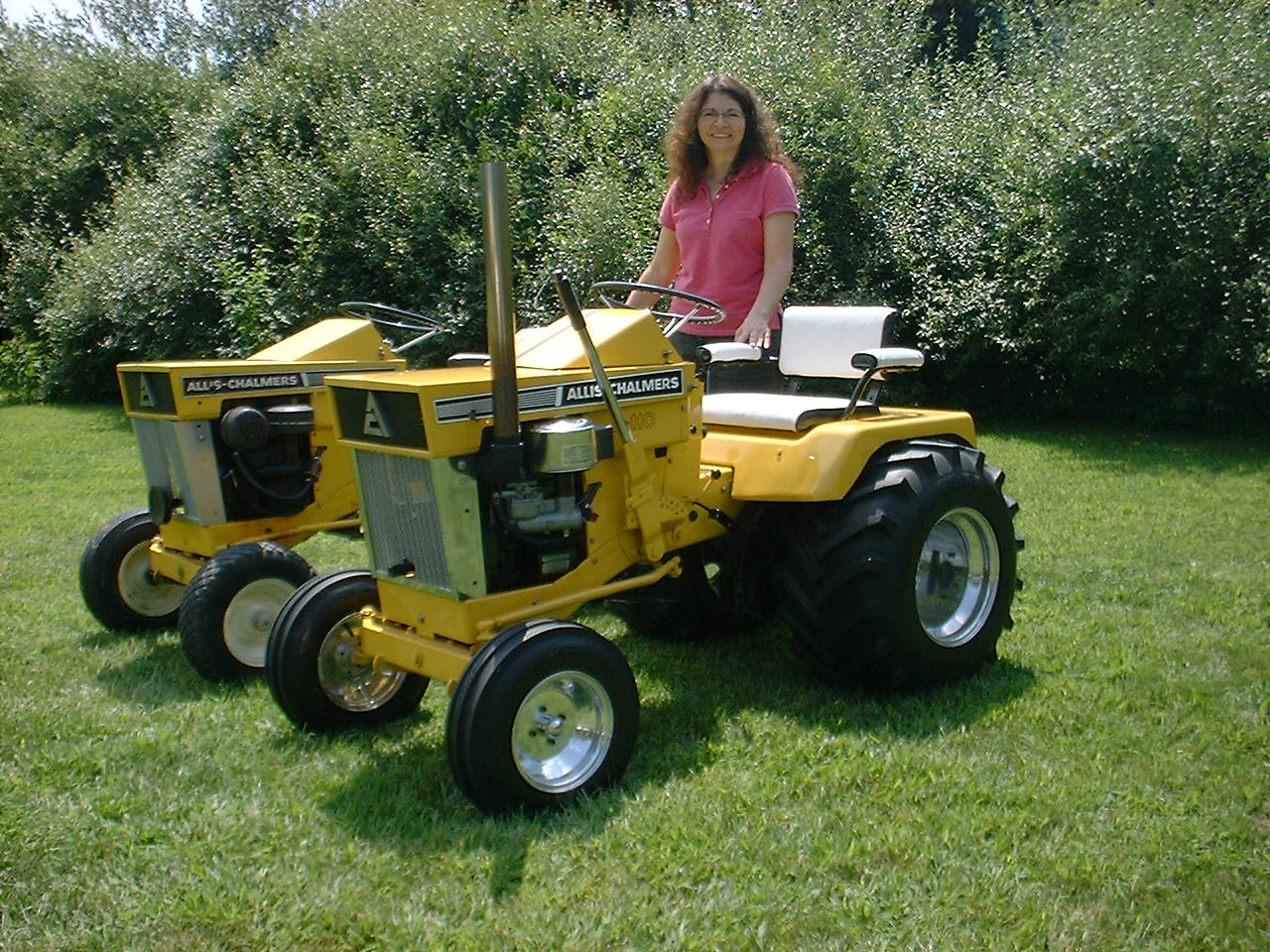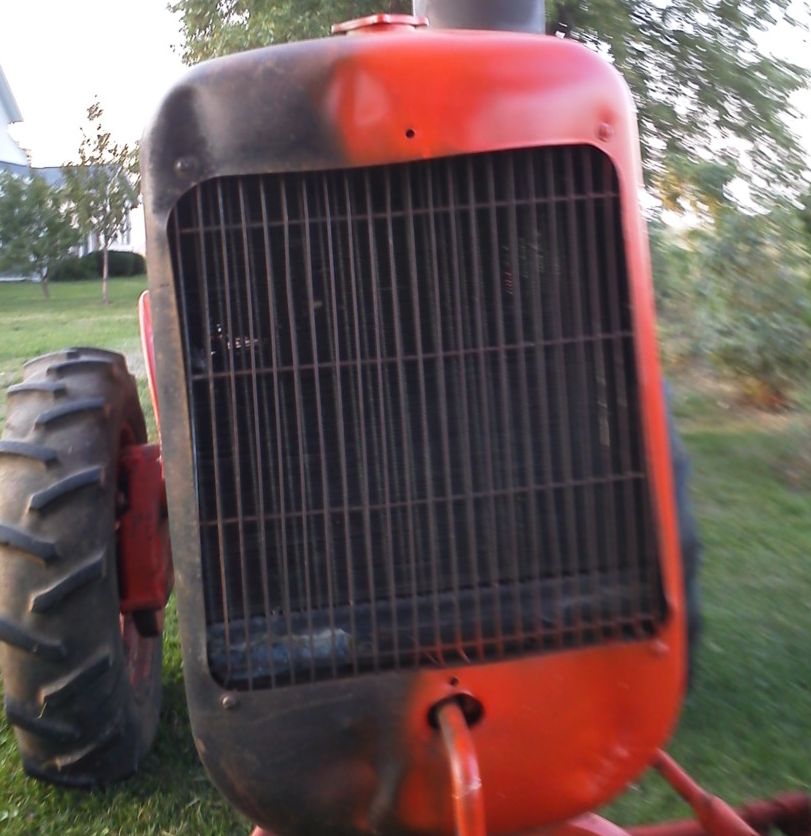| Author |
 Topic Search Topic Search  Topic Options Topic Options
|
Derricks 
Bronze Level

Joined: 10 Aug 2024
Location: Wisconsin
Points: 30
|
 Post Options Post Options
 Thanks(0) Thanks(0)
 Quote Quote  Reply Reply
 Topic: Fun Project; Need Some Help Topic: Fun Project; Need Some Help
Posted: 10 Aug 2024 at 7:28pm |
 
I recently extracted my childhood tractors from a barn they have sat in for the past 10 years.
As you know, they're D17 Series III and Series IV.
They ran and functioned perfectly when parked in 2014.
I'd like to get them restored myself.
I am hoping you all wonderful people can give me some guidance.
I want them to be mechanically sound, then cosmetically nice.
They are not running and I haven't even started anything.
First, where should I start?
Does anybody have a checklist or any specific guidance for me?
I'd be happy to pay.
I just want these done right, no matter how long it takes.
I'm looking for:
1) Drain the fuel by unhooking this hose, then do this
2) Clear out the ______ by ______
3) Check the ________ by pressing the ________
4) Buy a _________ from ________
etc.
They don't need to win any shows, but they should be mechanically sound and cosmetically nice.
Thanks in advance!
|
 |
|
Sponsored Links
|
|
 |
WF owner 
Orange Level

Joined: 12 May 2013
Location: Bombay NY
Points: 5052
|
 Post Options Post Options
 Thanks(0) Thanks(0)
 Quote Quote  Reply Reply
 Posted: 10 Aug 2024 at 7:36pm Posted: 10 Aug 2024 at 7:36pm |
The first thing I would do is put a battery in them and make sure they turn over. If they do, check to make sure you have spark. If you do have spark, I would drain the old gas out of them. When you get the gas out, check the condition of the inside of the gas tank. Check all fluids and see if you can get them to run. I would make sure they run, before you change fluids, but when you get it running, all fluids should be changed; engine oil, antifreeze and everything else can be changed to 821 (equivalent) hydraulic fluid .
Edited by WF owner - 10 Aug 2024 at 7:37pm
|
 |
Mikez 
Orange Level Access


Joined: 16 Jan 2013
Location: Usa
Points: 8740
|
 Post Options Post Options
 Thanks(0) Thanks(0)
 Quote Quote  Reply Reply
 Posted: 10 Aug 2024 at 8:32pm Posted: 10 Aug 2024 at 8:32pm |
Welcome to the forum. First thing is buy there operators and parts manuals. And a IT manual has good info to. Goodluck there great tractors
|
 |
Derricks 
Bronze Level

Joined: 10 Aug 2024
Location: Wisconsin
Points: 30
|
 Post Options Post Options
 Thanks(0) Thanks(0)
 Quote Quote  Reply Reply
 Posted: 10 Aug 2024 at 8:56pm Posted: 10 Aug 2024 at 8:56pm |
Thank you!
So the initial turn over is to test the engines aren't seized, right?
I do NOT want to try to run them with existing fluids, right?
So other than gas, if the other fluids are there I can let it run enough to know it'll fire?
Sorry for the questions, don't want to screw these things.
|
 |
DrAllis 
Orange Level Access

Joined: 12 Sep 2009
Points: 22111
|
 Post Options Post Options
 Thanks(0) Thanks(0)
 Quote Quote  Reply Reply
 Posted: 10 Aug 2024 at 9:46pm Posted: 10 Aug 2024 at 9:46pm |
|
They have been in a shed for years. Leave the old fluids in and get them running. Drain the fuel tanks and inspect the fuel tanks when empty with a small flashlite. They may need to be power washed out or even lightly sand blasted inside. Expect carburetors to be in need of a teardown , cleaning and rebuilding. Get one new battery and use it to determine if the engines are stuck or not. If things go well, new AC Delco R45XL spark plugs that are gapped at .025" and probably new points gapped at .020". Use the OLD condensers !!! Change your fluids once they have been operated and driven for a half hour or so and drain when warmed up.
|
 |
Derricks 
Bronze Level

Joined: 10 Aug 2024
Location: Wisconsin
Points: 30
|
 Post Options Post Options
 Thanks(0) Thanks(0)
 Quote Quote  Reply Reply
 Posted: 10 Aug 2024 at 10:31pm Posted: 10 Aug 2024 at 10:31pm |
|
Thank you! So to be clear its safe to run it on the existing 10-year fluids for a small period of time?
|
 |
DiyDave 
Orange Level Access


Joined: 11 Sep 2009
Location: Gambrills, MD
Points: 54380
|
 Post Options Post Options
 Thanks(0) Thanks(0)
 Quote Quote  Reply Reply
 Posted: 11 Aug 2024 at 4:07am Posted: 11 Aug 2024 at 4:07am |
 Derricks wrote: Derricks wrote:
Thank you! So to be clear its safe to run it on the existing 10-year fluids for a small period of time? |
Yes, run them up to operating temperature (about 1/2hr), then change them when the fluids are warm... 
Check the Dipstick on the motor prior to starting, though. If the oil looks milky, check back in...
Edited by DiyDave - 11 Aug 2024 at 4:09am
|
|
Source: Babylon Bee. Sponsored by BRAWNDO, its got what you need!
|
 |
DrAllis 
Orange Level Access

Joined: 12 Sep 2009
Points: 22111
|
 Post Options Post Options
 Thanks(0) Thanks(0)
 Quote Quote  Reply Reply
 Posted: 11 Aug 2024 at 7:08am Posted: 11 Aug 2024 at 7:08am |
|
If the engine oil is OVERFULL, that is probably bad. Hopefully the antifreeze has been strong enough to avoid breaking the block. A good idea may be to remove the engine oil drain plug to the very last thread and slowly let out a very small amount. Any coolant or water will be right there if the engine hasn't been turned over or started. No coolant ?? That is a GREAT DAY for you !! You are talking about "restoring" these two tractors, and that's fine. What you don't know at this point is, to what DEGREE of restoration you are going to do ?? If you go ahead and change the engine oil and filter on both tractors, you are out the price of 7 quarts of oil and a filter for each. After doing so, you may run each engine a couple of hours (or maybe longer) and find out they smoke blue out the exhaust. This means oil burning and potentially and engine overhaul !!! Each tractor needs a thorough examination of all systems and make a list of what needs attention. My to-do list would automatically include new brake linings, springs and axle seals on both sides and removing and anti-seizing the brake rods. Front wheel bearings and seals would be next. All other fluids (assuming no repairs need to be made) to the hydraulic system, transmission/differential and both final drives. You need to use both tractors enough to pinpoint how many large or small oil leaks there are BEFORE any thoughts of painting takes place.
Edited by DrAllis - 11 Aug 2024 at 7:29am
|
 |
Derricks 
Bronze Level

Joined: 10 Aug 2024
Location: Wisconsin
Points: 30
|
 Post Options Post Options
 Thanks(0) Thanks(0)
 Quote Quote  Reply Reply
 Posted: 11 Aug 2024 at 8:18am Posted: 11 Aug 2024 at 8:18am |
Great advice, thank you very much! I can already tell this is going to be a huge undertaking...which I'm okay with. They mean a lot to me  It'll be fun to update you guys and make this a group project. I really appreciate your input.
|
 |
WF owner 
Orange Level

Joined: 12 May 2013
Location: Bombay NY
Points: 5052
|
 Post Options Post Options
 Thanks(0) Thanks(0)
 Quote Quote  Reply Reply
 Posted: 11 Aug 2024 at 8:27am Posted: 11 Aug 2024 at 8:27am |
I think what we are all saying here is you have to find out what your problems are with these tractors and make decisions from there. You said they worked well when they were parked, but they have been sitting for 10 years. Things dry out and crack. Nothing gets better sitting.
At some point, you have to decide how much money you are willing to invest in these tractors. You say they were your "childhood tractors", which means they have sentimental value to you. Sometimes that comes at a cost.
I have been working several years on my grandfather's WF (hence my forum "name"). It set out in a pasture for over 35 years, before I got it. I currently have over $7000 invested (I hope my wife doesn't read this!) and I am not done. When I am done, the tractor will probably realistically be worth $1500 - $2000. It will never be for sale in my lifetime. It will go to one of my grandchildren when I am gone.
Our point is that getting them running, without spending a lot of money or doing any damage to the tractors, will give you a chance to decide if you want to proceed with your plans on restoration. |
 |
DrAllis 
Orange Level Access

Joined: 12 Sep 2009
Points: 22111
|
 Post Options Post Options
 Thanks(0) Thanks(0)
 Quote Quote  Reply Reply
 Posted: 11 Aug 2024 at 8:39am Posted: 11 Aug 2024 at 8:39am |
|
And the word "restoration" means very different things to different people.
|
 |
Steve in NJ 
Orange Level Access


Joined: 12 Sep 2009
Location: Andover, NJ
Points: 12017
|
 Post Options Post Options
 Thanks(0) Thanks(0)
 Quote Quote  Reply Reply
 Posted: 11 Aug 2024 at 10:00am Posted: 11 Aug 2024 at 10:00am |
After you've gotten these Tractors up and running, and you are deciding to start disassembling them for your resto, it's always a great idea to purchase some different size zip lock lunch bags. This way, as you start removing nuts, bolts, brackets etc., as they come off the Tractor, put them in the bag that the part would fit in, zip lock it shut so nothing gets lost, and write on the bag with permanent marker what it is and put it in a box so when the time comes to reassemble, you know what goes where. Even if the bolts are rusty or broke off. You'll know come reassembly time you need to renew some of the bolts and you'll have a sample of the original. All good things take time, and if it takes a while (6 months to a year, sometimes more) depending on life in general, you'll know where things go down the road...... Good Luck! Have fun!! Steve@B&B
|
|
39'RC, 43'WC, 48'B, 49'G, 50'WF, 65 Big 10, 67'B-110, 75'716H, 2-620's, & a Motorhead wife
|
 |
Jacob (WI,ND) 
Orange Level


Joined: 11 Sep 2009
Location: Kenmare, ND
Points: 1248
|
 Post Options Post Options
 Thanks(0) Thanks(0)
 Quote Quote  Reply Reply
 Posted: 11 Aug 2024 at 11:57am Posted: 11 Aug 2024 at 11:57am |
Welcome to the forum! If they were really in functional shape when parked, it shouldn't take but a few weekends of tinkering and maintenance to get them running again, that is assuming you have some idea what you are doing. Which sounds like you are just learning, so it may take a bit longer. First step is to get manuals for the tractor, and READ them. You will answer 90% of your questions there. Next would be to let us know where in WI are you located? It would be nice if you could connect up with someone in your area who knows how to go about this, and give you some pointers and help in person. There are quite a few of us in the WI area (I am in the process of moving back myself currently). Take your time, and don't expect things to go smoothly or easily, that is where most people get frustrated and quit. Getting a tractor going, let alone restoring one, is a very long and laborious process. we're not talking days, but months or years often. I'm not trying to scare you, we all start there, just know what you are getting into. I'd suggest, pick one and focus on it first. Get it going, then you'll "know what you're doing" and the second will be twice as easy. You won't mix up parts that way either. And anything you take apart, photo how it was, bag and label EVERYTHING! It may be a while until it goes back together, and the biggest lie we tell ourselves is that we will remember how it goes back together, we won't LOL! You got this, keep at it and keep us posted!
|
|
Jacob Swanson
1920 6-12; 1925,1926 20-35 longfenders; 1925,1926 15-25's; 1927,1929 20-35 shortfenders; C; B's; IB; WC's; WD; WD45
|
 |
captaindana 
Orange Level

Joined: 14 Sep 2009
Location: Fort Plain, NY
Points: 2573
|
 Post Options Post Options
 Thanks(0) Thanks(0)
 Quote Quote  Reply Reply
 Posted: 11 Aug 2024 at 12:05pm Posted: 11 Aug 2024 at 12:05pm |
|
Geeez Steve in Joisey why didn’t you ever mention to me about your zip lock secret? 😢😢
|
|
Blue Skies and Tail Winds
Dana
|
 |
Derricks 
Bronze Level

Joined: 10 Aug 2024
Location: Wisconsin
Points: 30
|
 Post Options Post Options
 Thanks(0) Thanks(0)
 Quote Quote  Reply Reply
 Posted: 11 Aug 2024 at 3:42pm Posted: 11 Aug 2024 at 3:42pm |
 DrAllis wrote: DrAllis wrote:
Leave the old fluids in and get them running. Drain the fuel tanks and inspect the fuel tanks when empty with a small flashlite. They may need to be power washed out or even lightly sand blasted inside. |
Get it running with existing gas? Or, drain the gas and put new in first?
|
 |
Derricks 
Bronze Level

Joined: 10 Aug 2024
Location: Wisconsin
Points: 30
|
 Post Options Post Options
 Thanks(0) Thanks(0)
 Quote Quote  Reply Reply
 Posted: 11 Aug 2024 at 3:43pm Posted: 11 Aug 2024 at 3:43pm |
 DiyDave wrote: DiyDave wrote:
Check the Dipstick on the motor prior to starting, though. If the oil looks milky, check back in...
|
Will do, thank you!
|
 |
Derricks 
Bronze Level

Joined: 10 Aug 2024
Location: Wisconsin
Points: 30
|
 Post Options Post Options
 Thanks(0) Thanks(0)
 Quote Quote  Reply Reply
 Posted: 11 Aug 2024 at 3:45pm Posted: 11 Aug 2024 at 3:45pm |
 WF owner wrote: WF owner wrote:
I currently have over $7000 invested (I hope my wife doesn't read this!) and I am not done. When I am done, the tractor will probably realistically be worth $1500 - $2000. |
Oh man! I'm afraid to ask...is that just parts? Or did you hire out some of the labor/restoration?
What is the most expensive part?
|
 |
wjohn 
Orange Level


Joined: 19 Jan 2010
Location: KS
Points: 2256
|
 Post Options Post Options
 Thanks(0) Thanks(0)
 Quote Quote  Reply Reply
 Posted: 11 Aug 2024 at 4:16pm Posted: 11 Aug 2024 at 4:16pm |
For me it depends on how old/ugly the fluids are. I will make sure I can get it to fire with the old fluids (to me, engine oil is the scariest thing as far as causing damage to components) and then if I'm successful, shut it down fairly quickly and change out the engine oil. Coolant and trans/hydraulic fluids I usually wait to do until I've got new oil/filter in the engine and then get to run it long enough that I'm fairly confident the engine isn't knocking, smoking like a freight train, or has bad oil pressure.
It's not uncommon for a lot of condensation to have built up on the inside of the engine and transmission castings depending on where the tractor was stored. You'll definitely want to get all of that out of there eventually.
Another thing I will point out since I'm not sure it's been mentioned yet: since most of us have phones with decent cameras now, take lots of pictures. As said above, you tell yourself you'll remember how it goes back together. That might be true if things go according to plan and you put it back together within a few weeks, but sometimes life happens and it turns into a year or two! |
|
1939 B, 1940 B, 1941 WC, 1951 WD, 1952 CA, 1956 WD-45
|
 |
DrAllis 
Orange Level Access

Joined: 12 Sep 2009
Points: 22111
|
 Post Options Post Options
 Thanks(0) Thanks(0)
 Quote Quote  Reply Reply
 Posted: 11 Aug 2024 at 4:43pm Posted: 11 Aug 2024 at 4:43pm |
|
FRESH GASOLINE !!!
|
 |
Derricks 
Bronze Level

Joined: 10 Aug 2024
Location: Wisconsin
Points: 30
|
 Post Options Post Options
 Thanks(0) Thanks(0)
 Quote Quote  Reply Reply
 Posted: 11 Aug 2024 at 4:47pm Posted: 11 Aug 2024 at 4:47pm |
 Steve in NJ wrote: Steve in NJ wrote:
zip lock lunch bags. |
Epic, thank you!
|
 |
Derricks 
Bronze Level

Joined: 10 Aug 2024
Location: Wisconsin
Points: 30
|
 Post Options Post Options
 Thanks(0) Thanks(0)
 Quote Quote  Reply Reply
 Posted: 11 Aug 2024 at 4:48pm Posted: 11 Aug 2024 at 4:48pm |
 Jacob (WI,ND) wrote: Jacob (WI,ND) wrote:
I'd suggest, pick one and focus on it first. Get it going, then you'll "know what you're doing" and the second will be twice as easy. |
Awesome advice, thank you!
|
 |
WF owner 
Orange Level

Joined: 12 May 2013
Location: Bombay NY
Points: 5052
|
 Post Options Post Options
 Thanks(0) Thanks(0)
 Quote Quote  Reply Reply
 Posted: 11 Aug 2024 at 5:02pm Posted: 11 Aug 2024 at 5:02pm |
 Derricks wrote: Derricks wrote:
 WF owner wrote: WF owner wrote:
I currently have over $7000 invested (I hope my wife doesn't read this!) and I am not done. When I am done, the tractor will probably realistically be worth $1500 - $2000. |
Oh man! I'm afraid to ask...is that just parts? Or did you hire out some of the labor/restoration?
What is the most expensive part? |
I've probably got over $1500 in machine shop fees (engine rebuild, kingpins and rebushing the front axle). I had the (cracked) block professionally welded, when I could have used a different block cheaper. The rest is tires, rims and parts. I am just finishing up the rear end (differential). There is not one part I haven't rebuilt, even the steering box.
|
 |
Derricks 
Bronze Level

Joined: 10 Aug 2024
Location: Wisconsin
Points: 30
|
 Post Options Post Options
 Thanks(0) Thanks(0)
 Quote Quote  Reply Reply
 Posted: 11 Aug 2024 at 6:35pm Posted: 11 Aug 2024 at 6:35pm |
 WF owner wrote: WF owner wrote:
There is not one part I haven't rebuilt, even the steering box.
|
I love that dedication, man! I bet it's worth it.
|
 |
Derricks 
Bronze Level

Joined: 10 Aug 2024
Location: Wisconsin
Points: 30
|
 Post Options Post Options
 Thanks(0) Thanks(0)
 Quote Quote  Reply Reply
 Posted: 11 Aug 2024 at 6:36pm Posted: 11 Aug 2024 at 6:36pm |
 wjohn wrote: wjohn wrote:
For me it depends on how old/ugly the fluids are. I will make sure I can get it to fire with the old fluids (to me, engine oil is the scariest thing as far as causing damage to components) and then if I'm successful, shut it down fairly quickly and change out the engine oil. Coolant and trans/hydraulic fluids I usually wait to do until I've got new oil/filter in the engine and then get to run it long enough that I'm fairly confident the engine isn't knocking, smoking like a freight train, or has bad oil pressure. |
This is gold; thank you so much! Epic stuff.
|
 |
CA13414 
Silver Level


Joined: 25 Feb 2024
Location: Nebraska
Points: 378
|
 Post Options Post Options
 Thanks(0) Thanks(0)
 Quote Quote  Reply Reply
 Posted: 11 Aug 2024 at 7:08pm Posted: 11 Aug 2024 at 7:08pm |
|
Welcome to the forum. It is a great place where there is a ton of expertise and wisdom!!
I joined in February and it has a blast these past months working on our family CA. My wife jokingly refer's to being a "Tractor Widow!" Which has happened often with my various projects over the years.
Anyway, you will find the group here spectacular! Enjoy!
Edited by CA13414 - 11 Aug 2024 at 8:55pm
|
|
Helping the aged survive and thrive! 1953 CA
|
 |
Boss Man 
Orange Level

Joined: 03 Mar 2018
Location: Greenleaf, WI
Points: 617
|
 Post Options Post Options
 Thanks(0) Thanks(0)
 Quote Quote  Reply Reply
 Posted: 11 Aug 2024 at 8:34pm Posted: 11 Aug 2024 at 8:34pm |
|
Nothing like the feeling of cleaning the carb, draining the gas tank, adding fresh gas, cleaning the points and bringing an old tractor back to life. Often you can put tension on the fan belt with on hand and pull the fan with the other to see if the motor turns. Or pull the starter and use a screw driver or pry bar to turn the motor before investing in a battery. As someone else said there's probably tractor enthusiast in your area willing to help and guide you in person. Doesnt hurt to attend a few tractor shows and talk to people displaying tractors.
|
 |
Derricks 
Bronze Level

Joined: 10 Aug 2024
Location: Wisconsin
Points: 30
|
 Post Options Post Options
 Thanks(0) Thanks(0)
 Quote Quote  Reply Reply
 Posted: 13 Aug 2024 at 10:12pm Posted: 13 Aug 2024 at 10:12pm |
 CA13414 wrote: CA13414 wrote:
My wife jokingly refer's to being a "Tractor Widow!" Which has happened often with my various projects over the years.
Anyway, you will find the group here spectacular! Enjoy! |
Uh oh! haha thanks for the heads up.
Thank you for the warm welcome! Hope your project is coming along how you're hoping for it to!
|
 |
Derricks 
Bronze Level

Joined: 10 Aug 2024
Location: Wisconsin
Points: 30
|
 Post Options Post Options
 Thanks(0) Thanks(0)
 Quote Quote  Reply Reply
 Posted: 13 Aug 2024 at 10:19pm Posted: 13 Aug 2024 at 10:19pm |
|
Update...
As recommended, I purchased the User Manual for both the Series III and Series IV on eBay and am waiting for it to arrive to really familiarize myself with the ins-and-outs of these tractors.
I'll then purchase fluids and filters, batteries, and 'hopefully' get them fired up so I can assess where they're at!
|
 |
DaveKamp 
Orange Level Access


Joined: 12 Apr 2010
Location: LeClaire, Ia
Points: 6088
|
 Post Options Post Options
 Thanks(0) Thanks(0)
 Quote Quote  Reply Reply
 Posted: 13 Aug 2024 at 11:07pm Posted: 13 Aug 2024 at 11:07pm |
I always check the fluid level and conditions before anything else.... then I attempt to turn them over by hand. Put the transmission in neutral, and attempt to depress the clutch, take note of how it feels underfoot, as this may give you a clue as to wether the plates are rust-adhered to the flywheel.
As others noted, these things can have seals dry and leak, don't assume there's fluid IN, and next... condensate and rain can get IN, so don't assume that what's IN there... is actually what you WANT in there. As Doc noted, coolant in the oilpan is a bad sign, but it's not end-of-the-world.
Since these tractors are members of your family, your greatest investment will be TIME. If you throw out TIME as a cost (which you should), then it just comes down to parts and materials. Don't predispose yourself to acquiring only new parts, and don't dismiss a component simply because it isn't 'like new'... there's plenty of circumstances where a part has degraded, but can be returned to serviceable condition without considerable difficulty or expense.
Other things:
Don't assume the exhaust isn't full of bird droppings. Don't assume the brake/axle housings aren't full of beech nuts. Don't assume the wiring has any insulation, and yes, there will be mouse nests... and they do ignite FAST...
Don't assume the gasoline is actually gasoline Don't assume anything liquid will actually flow through anything tubular. Don't assume that something that seals at room temperature under workshop conditions will also seal when the engine is running, and the transmission is working... Don't assume that a 'brand new part' will be better than an old one (breaker points and condenser especially)
Finally... With this being your first, get them both checked out, fired up, and running, and as operational as you can... then pick ONE to use, and the OTHER to work on. Pick the best tires, move them to the worker... and shop the project.
Do all your project mechanical work in SEGMENTS... one segment at-a-time. As you do it, each segment gets you closer to a well-finished machine. There's segments and processes that will make you feel defeated at times... all the parts that you've succeeded, will bring you confidence that the BAD DAYS are winnable too.
As for tractor restorations, an old friend told me that the most suitable restoration candidate has either a good engine, or good tires... a REALLY EASY one has both. His point was, that an engine rebuild kit-and-process is expensive... and wheels-and-tires are expensive too. They're not impossible, they're just big investments. Fortunately, when you do 'em, they're done, and last a LONG time.
|
|
Ten Amendments, Ten Commandments, and one Golden Rule solve most every problem. Citrus hand-cleaner with Pumice does the rest.
|
 |
jvin248 
Silver Level


Joined: 17 Jan 2022
Location: Detroit
Points: 476
|
 Post Options Post Options
 Thanks(0) Thanks(0)
 Quote Quote  Reply Reply
 Posted: 14 Aug 2024 at 10:48pm Posted: 14 Aug 2024 at 10:48pm |
.
I would start your project by manually rotating the engines, not a battery and starter. Pull on the fan belt or turn the engine with a crank. That way you don't bend something.
Watch YouTube videos on Vice Grip Garage, like these. Derek goes through the steps you'll need, and tools that are helpful.
https://youtu.be/Q4W9TWrwnh0?si=MOBrZ3VDqe2yQGt9
Edited by jvin248 - 14 Aug 2024 at 10:51pm
|
 |









 Topic Options
Topic Options

 Post Options
Post Options Thanks(0)
Thanks(0)





 Derricks wrote:
Derricks wrote:







